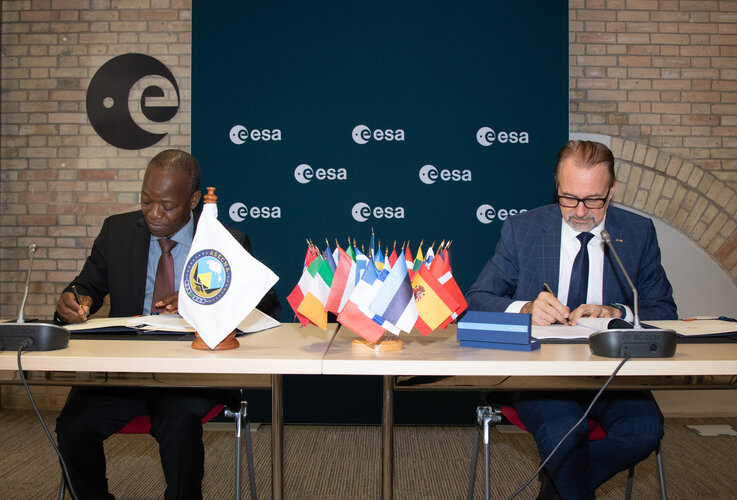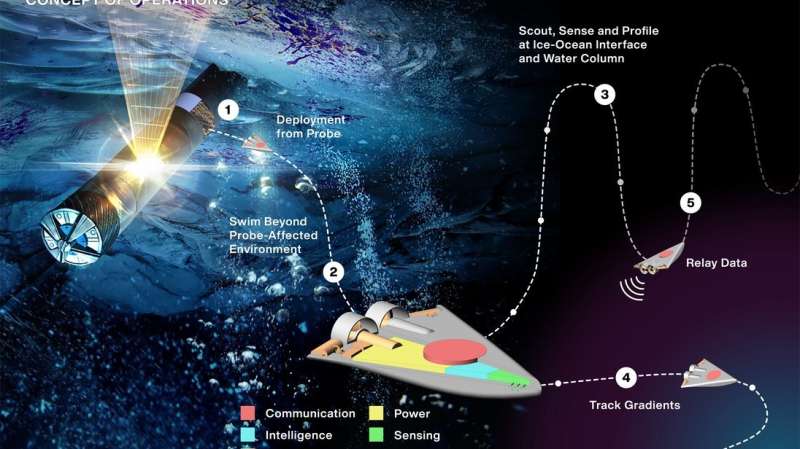EGNOS technology for Africa – ESA signs deal with ASECNA
Wednesday, 29 June 2022 14:10
European technology that allows satellite navigation signals to safely guide aircraft down for landing in the majority of Europe’s airports will now be put to use across Africa and the Indian Ocean. ASECNA, the Agency for Air Navigation Safety in Africa and Madagascar, and ESA today signed an agreement to deploy a Satellite-based Augmentation System (SBAS) across a service region of more than 16.5 million sq. km, one and a half times the size of Europe’s coverage area.
Avio gets pandemic recovery funds to develop launchers for the 2030s
Wednesday, 29 June 2022 13:38
Italian rocket maker Avio secured 340 million euros ($358 million) in government funding June 29 to develop launch vehicles for the next decade.
The post Avio gets pandemic recovery funds to develop launchers for the 2030s appeared first on SpaceNews.
Swarm of tiny swimming robots could look for life on distant worlds
Wednesday, 29 June 2022 13:05
Someday, a swarm of cellphone-size robots could whisk through the water beneath the miles-thick icy shell of Jupiter's moon Europa or Saturn's moon Enceladus, looking for signs of alien life.
Sierra Space signs agreement with Turkish Space Agency
Wednesday, 29 June 2022 12:00
Sierra Space announced an agreement with the Turkish Space Agency and an affiliated company June 29 that could lead to cooperation on human spaceflight and lunar missions.
The post Sierra Space signs agreement with Turkish Space Agency appeared first on SpaceNews.
One ESA: an interactive journey around ESA sites!
Wednesday, 29 June 2022 06:35
We are a huge organisation of 5000+ people operating at nine different locations. How do we work together to achieve our goals and fly our missions?
Impact in 2052 ruled out as ESA counts down to Asteroid Day
Wednesday, 29 June 2022 06:00
Contract secures design for ESA's FORUM satellite
Wednesday, 29 June 2022 05:30 ESA has awarded a contract worth 160 million euro to Airbus in the UK to build the Earth Explorer FORUM satellite. This exciting new mission will yield unique insight into the planet's radiation budget and how it is controlled - thereby filling in a critical missing piece of the climate jigsaw.
Short for Far-infrared Outgoing Radiation Understanding and Monitoring, FORUM is ESA's ninth Ear
ESA has awarded a contract worth 160 million euro to Airbus in the UK to build the Earth Explorer FORUM satellite. This exciting new mission will yield unique insight into the planet's radiation budget and how it is controlled - thereby filling in a critical missing piece of the climate jigsaw.
Short for Far-infrared Outgoing Radiation Understanding and Monitoring, FORUM is ESA's ninth Ear Tough new robots will aim to think and act for themselves on Earth and beyond
Wednesday, 29 June 2022 05:30 A new generation of smart robots is being developed at The University of Manchester as part of an ambitious R and D programme to help the UK maintain its leadership in automatation technologies,
These new AI-powered machines will be designed to think and act for themselves in some of the most hazardous and toughest places on Earth - and beyond. These robots will be challenged to carry out
A new generation of smart robots is being developed at The University of Manchester as part of an ambitious R and D programme to help the UK maintain its leadership in automatation technologies,
These new AI-powered machines will be designed to think and act for themselves in some of the most hazardous and toughest places on Earth - and beyond. These robots will be challenged to carry out NASA, Rocket Lab launch orbiter to help pave way for astronauts' return to moon
Wednesday, 29 June 2022 05:30 NASA's CAPSTONE mission spacecraft lifted off into space Tuesday morning on a mission to orbit the moon, moving scientists closer to returning astronauts.
The unmanned lunar orbiter took off on top of a Rocket Lab booster from New Zealand's Mahia Peninsula. The mission was originally set for Monday but was delayed to make a final systems check.
The Cislunar Autonomous Positioning
NASA's CAPSTONE mission spacecraft lifted off into space Tuesday morning on a mission to orbit the moon, moving scientists closer to returning astronauts.
The unmanned lunar orbiter took off on top of a Rocket Lab booster from New Zealand's Mahia Peninsula. The mission was originally set for Monday but was delayed to make a final systems check.
The Cislunar Autonomous Positioning NanoAvionics records first ever 4K resolution full satellite selfie in space
Wednesday, 29 June 2022 02:49 NanoAvionics have used an off-the-shelf consumer camera, mounted on a selfie stick, to take the first ever 4K resolution full satellite selfie in space with an immersive view of Earth. The 12-megapixel photos and 4K video clips, taken with a GoPro Hero 7, show the company's MP42 microsatellite flying 550 km above the Coral Sea and the Great Barrier Reef - the only living structure visible from s
NanoAvionics have used an off-the-shelf consumer camera, mounted on a selfie stick, to take the first ever 4K resolution full satellite selfie in space with an immersive view of Earth. The 12-megapixel photos and 4K video clips, taken with a GoPro Hero 7, show the company's MP42 microsatellite flying 550 km above the Coral Sea and the Great Barrier Reef - the only living structure visible from s NASA completes Wet Dress Rehearsal, moves forward toward launch
Wednesday, 29 June 2022 02:49 NASA has analyzed the data from the wet dress rehearsal conducted Monday, June 20, and determined the testing campaign is complete. The agency will roll Space Launch System (SLS) and Orion back to the Vehicle Assembly Building (VAB) at Kennedy next week to prepare the rocket and spacecraft for launch.
"During the wet dress rehearsal activities, we have incrementally added to our knowledg
NASA has analyzed the data from the wet dress rehearsal conducted Monday, June 20, and determined the testing campaign is complete. The agency will roll Space Launch System (SLS) and Orion back to the Vehicle Assembly Building (VAB) at Kennedy next week to prepare the rocket and spacecraft for launch.
"During the wet dress rehearsal activities, we have incrementally added to our knowledg How scientist proposed a novel Kalman filter for target tracking in space
Wednesday, 29 June 2022 02:49 The space station is a bridgehead for human space exploration missions. During its construction, operation, and maintenance, there are a variety of tasks that need to be performed. However, the space environment has harsh conditions such as microgravity, high vacuum, strong radiation, and large temperature differences, which seriously threaten the health and life safety of astronauts.
Sinc
The space station is a bridgehead for human space exploration missions. During its construction, operation, and maintenance, there are a variety of tasks that need to be performed. However, the space environment has harsh conditions such as microgravity, high vacuum, strong radiation, and large temperature differences, which seriously threaten the health and life safety of astronauts.
Sinc Rocket Lab launches CAPSTONE microsat to test new lunar orbit design for NASA
Wednesday, 29 June 2022 02:49 NASA's CubeSat designed to test a unique lunar orbit is safely in space and on the first leg of its journey to the Moon. The spacecraft is heading toward an orbit intended in the future for Gateway, a lunar space station built by the agency and its commercial and international partners that will support NASA's Artemis program, including astronaut missions.
The Cislunar Autonomous Positioni
NASA's CubeSat designed to test a unique lunar orbit is safely in space and on the first leg of its journey to the Moon. The spacecraft is heading toward an orbit intended in the future for Gateway, a lunar space station built by the agency and its commercial and international partners that will support NASA's Artemis program, including astronaut missions.
The Cislunar Autonomous Positioni Virgin Orbit establishes sew Brazilian subsidiary; now licensed for launch operations in Alcantara
Wednesday, 29 June 2022 02:49 Virgin Orbit (Nasdaq: VORB) alongside the Brazilian Space Agency has announced Virgin Orbit has been formally granted an operator's license to allow LauncherOne launch operations in Brazil.
The license is granted to Virgin Orbit Brasil Ltda. (VOBRA), a newly formed and wholly owned Brazilian subsidiary dedicated to bringing the LauncherOne air-launch rocket system to the Alcantara Launch C
Virgin Orbit (Nasdaq: VORB) alongside the Brazilian Space Agency has announced Virgin Orbit has been formally granted an operator's license to allow LauncherOne launch operations in Brazil.
The license is granted to Virgin Orbit Brasil Ltda. (VOBRA), a newly formed and wholly owned Brazilian subsidiary dedicated to bringing the LauncherOne air-launch rocket system to the Alcantara Launch C Digging into our new drill hole: Sols 3517-3518
Wednesday, 29 June 2022 02:49 After a successful drilling of Avanavero, the team is ready to dig even deeper into our investigation of this new drill target. Tosol's plan includes an important part of this process: our initial analysis of the drilled sample with the CheMin instrument.
In addition, the team planned three full hours of remote science activities at this new drill site, including a ChemCam LIBS observation
After a successful drilling of Avanavero, the team is ready to dig even deeper into our investigation of this new drill target. Tosol's plan includes an important part of this process: our initial analysis of the drilled sample with the CheMin instrument.
In addition, the team planned three full hours of remote science activities at this new drill site, including a ChemCam LIBS observation 
